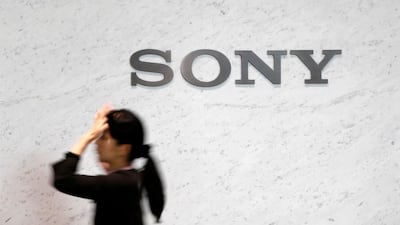Japan’s Sony reported a 48 per cent drop in operating earning for the July to September quarter as earthquake damage continued to affect its cash-cow imaging sensor business, while domestic rival Sharp said cost cutting would lead to ita first profit in three years.
Sony’s second-quarter profit fell to ¥45.7 billion (Dh1.6bn) from ¥88bn a year earlier. That compared with a Reuters estimate of ¥46.27bn drawn from 10 analyst estimates.
The result came a day after Sony lowered its full-year profit forecast by 10 per cent to ¥270bn due mainly to an impairment charge of ¥33bn brought about by the sale of its battery business.
Investors were unfazed by the downward revision as Sony maintained its sales outlook of ¥7.4 trillion, and losses related to the battery business sale had been flagged earlier.
Its shares closed down 0.7 per cent ahead of the earnings release, compared with a flat finish in the benchmark Nikkei stock price index.
Emerging from years of restructuring, the consumer electronics manufacturer is refocusing its business to concentrate on videogames, entertainment and imaging sensors, and the sale of its battery business was part of that effort.
Its sensors business continued to struggle in the second quarter as a key factory damaged by a series of earthquakes in April took almost half a year to recover to pre-disaster levels.
The business is part of Sony’s semiconductor division, which swung to an operating loss of ¥4.2bn from a year-before profit of ¥34.1bn.
The company nevertheless trimmed its estimated quake impact on full-year earnings to ¥53.5bn from ¥80bn.
In gaming, operating profit fell to ¥19bn from ¥23.9bn as income earned abroad was dulled by a strong domestic currency.
Investors are betting on momentum in the gaming business to pick up toward the year-end holiday shopping season with the launch later this month of the PlayStation 4 Pro, an upgrade capable of rendering high-definition graphics.
Sony is also widely expected to build an early lead in the fledgling virtual-reality (VR) market, with a headset priced more modestly than those of rivals and available to its 40 million existing users of its flagship consoles.
Analysts said VR could help Sony to attract non-core gamers to its PlayStation platform as the firm looks to extend content for the headset into non-gaming areas such as music, TV and film.
Sharp, meanwhile, forecast its first annual operating profit in three years, citing efforts to cut costs and add synergies after Taiwan’s Foxconn Technology Group bought control of the Japanese company in August.
Operating profit will reach ¥25.7bn in the 12 months ending March 2017, the Osaka company said. That compares with a ¥12.9bn average of 10 analysts’ estimates compiled by Bloomberg. Sharp forecast sales for the fiscal year would reach ¥2tn, compared with analyst estimates of ¥2.11tn.
Sharp’s stock has doubled since early August when Foxconn completed its capital injection. While the ¥289bn rescue package brought the Japanese company back from the brink of bankruptcy, Sharp now needs to prove it can revamp its liquid-crystal display business, stem losses in the solar panel operations and reverse a decline in consumer electronics sales. Tai Jeng Wu, who took over as Sharp’s president in August, is delivering his first earnings report in Tokyo on Tuesday.
Sharp’s operating profit in the second quarter was ¥2.6bn, according to a Bloomberg calculation based on first half results. That compares with analyst estimates of ¥10.6bn.
The net loss for the fiscal year will probably narrow to ¥41.8bn, Sharp forecast. Analysts expected an annual shortfall of ¥36.2bn for the year ending March 2017. Thanks to Foxconn’s investments, Sharp’s liabilities no longer exceed assets, allowing the company to focus on improving its core business.
* Reuters
* The National and CNBC are global content sharing partners. The video below originally appeared on
business@thenational.ae
Follow The National's Business section on Twitter

